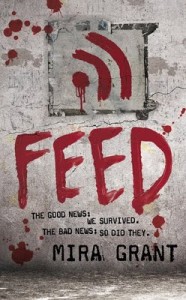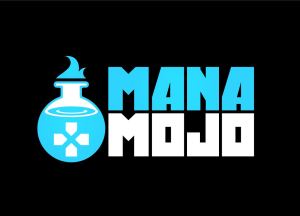 Welcome to the seventh instalment of Dust Jacket, and the second in our 5-week series reviewing the 2011 Hugo Award nominees. This week, we’re stepping into the realm of zombie fiction with Mira Grant’s Feed.
Welcome to the seventh instalment of Dust Jacket, and the second in our 5-week series reviewing the 2011 Hugo Award nominees. This week, we’re stepping into the realm of zombie fiction with Mira Grant’s Feed.
As always, I’m joined by Luke, the world’s harshest critic.
WHAT YOU NEED TO KNOW
The year is 2039, twenty odd years after the zombie rising. In curing both cancer and the common cold, scientists had unwittingly created a new, more deadly virus, one that resulted in the dead reanimating as mindless undead zombies. Within walled-in communities, humanity continues to survive and go about living their lives, while outside, the threat of zombie incursion remains.
Into this new world has emerged a new breed of online journalist. Georgia Mason is one such journalist, maintaining an online blog and website detailing her adventures. Alongside her brother Shaun and friend Buffy, Georgia is driven by an ongoing quest for truth.
Assigned to the Presidential campaign of Senator Peter Ryman, Georgia and her team discover a conspiracy to assassinate the Presidential candidate. Only George can uncover the truth behind the conspiracy.
WHAT WE THOUGHT
DAVID: From the very beginning of Feed, it’s apparent that Grant is more concerned with creating a franchise than telling a compelling story. Her characters are, at best, one-dimensional caricatures, designed to appeal on the most superficial level. It’s almost as if the author has written down a list of everything she believes modern audiences will find “cool” and crammed it into one neat package: Georgia Mason.
We’re introduced to Georgia and her brother Shaun in the middle of a flight from a horde of zombies, complete with daring motorcycle getaway. See how “cool” she is? It doesn’t take long for Grant to try to convince us that Georgia’s is the coolest character ever: she has her own blog, she dresses in black, she rides a motorcycle; she’s tough, she has just the right level of cynicism but also a certain nobility and an overwhelming desire to find the truth. She’s also completely unbearable as a character, designed entirely for mass market appeal. There’s no depth to her whatsoever and absolutely no reason to care for her.
LUKE:“You are possibly cooler than God,” Shaun says to his sister after the Evel Keneval stunt. I can just imagine Mira Grant punching the air, then patting herself on the back for creating a kick-ass heroine. Well done, Mira. No other person has created such an embodiment of female empowerment. “Stop antagonising the locals and get back on the bike,” I said, glaring from behind my sunglasses.It’s sassy cool (without Lois Lane’s insight or wit) with glasses and a motorbike (without Trinity’s tough demeanour). She has an attitude and that’s it. Georgia is an amalgam of better characters (Kara “Starbuck” Thrace and Kitty Pryde from the X-Men spring to mind) but adds nothing new. Why should we care about her? Because she can jump her bike over a zombie horde?Because she gets on well with her brother? Because she and Shaun have been used as pawns to further their parent’s popularity? These things should make her interesting. They should get me to care and admire about her. But instead the author just takes it as a given that these things will explain Georgia’s attitude, with the hope that it’s enough to get the audience onside. It’s not. These elements are not explored but we are told ad-nauseum about them. Which also gets in the way of seeing Georgia do anything.This wanton disregard for ‘Show, don’t tell’ (a golden rule of storytelling) seems to apply to the other characters. Georgia tells us that Shaun is not as dumb as he pretends. Why couldn’t we be shown that instead?
DAVID: The plot is equally frustrating. Georgia and her team join the Presidential campaign, uncovering a plot to assassinate Senator Peter Ryman. Suddenly, the tone of the novel shifts from zombie story to political thriller. Somebody is out to kill the noble, charismatic senator, and only Georgia can uncover the truth! All of a sudden, the zombies become completely incidental to the plot, which reads more like a badly written Tom Clancy novel. One wonders why this story even needs to be set in a post-apocalyptic zombie future, and the only conclusion that I could draw was that Grant wants to cash in on the current zombie craze. Once again, we see the worst example of writing for franchise, cashing in on whatever trend is cool in current popular culture.
LUKE: There’s a plot? Where? All that’s on display is exposition heaped upon exposition as Grant tries to convince how thorough her world building is. In some respects, it’s meant to be a comment on the media’s increasing inability to determine fact from opinion. News is news and spin is spin, and when you introduce the second to the first, what you have isn’t news anymore. In other respects, it’s meant to be about fighting off hordes of ravenous zombies. If you think hard enough, one can be used to comment on the other (think Romero’s anti-consumerism commentary in Dawn of the Dead). Mira Grant clearly hasn’t thought hard enough.
DAVID: Even as a political thriller, Feed fails to capture my interest. The mystery is not very compelling, and the various plot twists and turns are either badly foreshadowed and painfully obvious or so completely out of left field as to defy suspension of disbelief. Grant is not a mystery writer and it shows; her attempts to construct a conspiracyand clumsy and amateurish.
LUKE: Zombies don’t respect conspiracy. Conspiracy is for the living.It’s from Georgia’s first blog entry. On the face of it, you could argue that Grant is being upfront about the zombies being peripheral to the human story. But then why have the zombies at all. In and of themselves, zombies aren’t particularly interesting. But when used effectively, they are a great metaphor for the breakdown of society, an example of which is Robert Kirkman’s The Walking Dead. No, Grant shouldn’t just recreate Kirkman’s comic. But she could at least take Kirkman’s lead by using the zombies to heighten the dramaand human conflict.
The important word in that quote is conspiracy. It’s the first hint that there may be something rotten in state of Feed (and not just decaying flesh). It’s meant to get the reader to plow through chapter two and onwards. It promises lies to be uncovered, secrets to be exposed, truths to be unearthed, villains to be unmasked. It promises a deeper mystery at the novel’s beating heart. Georgia is meant to be concerned with uncovering real news. Yet for the first hundred pages, she does nothing in terms of investigative reporting. What story is she pursuing? What does she want to know? Mystery is all about discovery. A question is asked. The hero works to answer it. And that question should not be asked after page 100. It should be asked right from the start. Instead, Grant feels that her character should jump her bike over a zombie horde. The argument could be made she’s not writing a mystery. But Georgia’s the one who introduces the idea of conspiracy, and the promises it accompanies.
DAVID: One thing I personally dislike is overt pop cultural referencing, designed to acknowledge the influences on a novel by referring to them incessantly. Usually, all this achieves is drawing our attention to the far superior products the author is copying/ripping off/paying homage to. In this instance, we get reference after reference to the excellent George A. Romero Living Dead movies, the benchmark for modern zombie storytelling. There are no less than four such references in the first 100 pages alone; he’s even described as one of the accidental saviours of the human race as his movies taught us everything we need to know about dealing with zombies. There are also references to Buffy the Vampire Slayer, another obvious influence on Grant. These references, meant to show how pop-culturally aware and post-modern the author is, merely highlight how inane and unoriginal her novel is.
LUKE: I’m going to lobby congress and parliament to back ‘Post Content Awareness Week.’ Here we can raise awareness for how popular culture has finally decided that the arm attached to its elbow looks far more appetising than the antelope leaping majestically on the plain. This self-referential nature (of which Feed appears to be an acolyte) renders stories in and of themselvesmeaningless. Yes, when the zombie apocalypse finally hits, we might very well feel in the midst of a George Romero ‘Dead’ movie. But I don’t need to be reminded over and over again that the Zombie Master is now seen as a saint. Where’s the invention on Grant’s part? Part of the greatness of stories is to witness the creativity of the human mind. Hell, one of her characters is named Buffy.
DAVID: If there’s one redeeming aspect of Feed, its Georgia’s blog entries themselves. At the end of each chapter, we’re given snippets from her website, and these blog entries provide an insight into the world that has developed since The Rising and how the zombie holocaust has shaped it. Unfortunately, these blog entries are far more interesting than the story of Georgia and the Presidential campaign. What’s worse, though, is that the information imparted in those entries is often repeated in the subsequent chapters, as though Grant doesn’t believe her audience is capable of retaining knowledge for more than 5 pages at a time.
LUKE: The blogs are also tight and to the point, which is another nod in their favour. The surrounding novel on the other hand is rambling and repetitive. Long, winding sentences are great for lyrical descriptions. For tense action sequences, a paragraph describing Zombie behaviour generally tends to be intrusive. Feed reads like a first draft rushed into publication. It would have benefited greatly from a good proof read and a finer line edit.
DAVID: What begins as a slightly irritating exercise in writing for Hollywood quickly develops into a dull, overly long and essentially poorly written novel that is trying desperately to convince us just how “cool” it really is. Unfortunately, all Grant manages to do is reveal her inability to write interesting plots, compelling mysteries or strong characterisation. ½ a Luke, mainly for the blog entries.
LUKE: Zero Lukes. I can’t even muster the half.
IS IT HUGO WORTHY?
DAVID: It boggles the mind that this glorified airport literature could even be nominated for SF’s most prestigious award. Was 2010-11 such a terrible year for fantasy and science fiction that this was the best they could find? I couldn’t imagine this book even coming close to winning.
LUKE: Even glorified airport literature might still be entertaining. This is an insult to intelligent lifeforms everywhere. Forget if it’s worthy of the Hugo. Was it worthy of being published?
WHAT DO YOU THINK?
We’ve just taken Feed to task in almost every conceivable way. Is our assessment accurate, or are we being too harsh on the novel? Is this book worthy of its nomination, or has its presence on the ballot sheet sullied these great awards? Send us your comments, criticisms and, most importantly, your votes! Help us compile the definitive list of Greatest Sci-Fi Masterpieces.
THE RANKINGS
Our list continues to take shape, as Feed claims the unenviable position at the bottom of our rankings.
POSITION TITLE AUTHOR RANKING
1 Foundation series Isaac Asimov 4.5
1 The Forever War Joe Haldeman 4.5
2 The City and the Stars Arthur C. Clarke 4
3 Non-Stop Brian Aldiss 3.5
4 Player of Games Ian M. Banks 3.25
5 Cryoburn Lois McMaster Bujold 2.25
6 Feed Mira Grant 0.5
BEHOLD…THE FUTURE!
Join us next week as Hugo month at NPC continues with our review of Connie Willis’ Blackout.









Great review guys! love the LUKES! keep it up….I love it when you get juicy and harsh….proves you are honest. half a Luke! haha